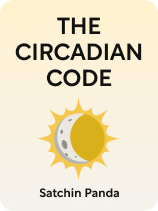

This article is an excerpt from the Shortform book guide to "The Circadian Code" by Satchin Panda. Shortform has the world's best summaries and analyses of books you should be reading.
Like this article? Sign up for a free trial here.
Are you struggling to feel energized throughout the day? Could your daily habits be disrupting your body’s natural rhythm?
The Circadian Code, a book by Satchin Panda, explores how modern lifestyles clash with our internal 24-hour clock. Panda offers simple adjustments to align your eating, sleeping, light exposure, and exercise habits with your body’s natural rhythm.
Keep reading to discover how small changes can lead to big improvements in your health and energy levels.
The Circadian Code Book Overview
How often do you feel truly rested and energized throughout the day? If your answer is “sometimes” or “rarely,” it might be because your circadian rhythm—your body’s natural 24-hour clock—has been disrupted. The Circadian Code, a book by Satchin Panda, explains that modern habits, like irregular sleep schedules, late-night eating, and excessive exposure to artificial light, throw off your circadian rhythm and can cause various health problems. Panda suggests simple adjustments you can make to your daily habits to live in sync with your circadian rhythm and be your healthiest and most energized self.
Panda is a biology professor working in the Regulatory Biology Laboratory at the Salk Institute for Biological Studies in California. He’s a Pew Scholar and the recipient of The Julie Martin Mid-Career Award in Aging Research. He designed an app called myCircadianClock that helps people track their lifestyle habits, understand their circadian rhythms, and contribute their data to research on health and circadian rhythms.
In this overview, we’ll first discuss how your circadian rhythm works and what happens when your lifestyle habits go against this rhythm. Then, we’ll explore ways to sync your eating, sleeping, light exposure, and exercise to your circadian rhythm.
What’s Your Circadian Rhythm?
Panda explains that your circadian rhythm is the internal 24-hour schedule that guides your body through the daily tasks needed to keep you healthy. This schedule, also called your internal clock, controls almost every aspect of your health and functioning, such as when to sleep, digest foods, and produce different hormones. Your body can’t accomplish all of its needs at once, so it must perform different functions during different times of the day.
How Lifestyle Habits Disrupt Your Circadian Rhythm
Panda argues that many modern lifestyle habits clash with our bodies’ natural circadian rhythms. Humans evolved to eat and work during the day and sleep at night, and this is the daily pattern that our bodies function best on. However, the discovery of fire allowed humans to defy their internal clocks by staying awake when it’s nighttime. Today, with technology and cheap electricity, we regularly disrupt our circadian rhythms.
Panda identifies four modern habits that disrupt your circadian rhythm:
- Eating at any hour of the day or night
- Going to bed late, sleeping in, and not getting enough sleep
- Not getting light exposure at the right times
- Not getting enough exercise
What Happens When Your Circadian Rhythm Gets Disrupted
Panda writes that disrupting your circadian rhythm can have many negative consequences for your health. It can increase the risk of various health issues, such as gastrointestinal disorders, obesity, diabetes, and cardiovascular problems. An unhealthy circadian rhythm can also lead to mental illnesses like depression and anxiety.
Panda warns that because a disrupted circadian rhythm can significantly harm your health, you must maintain a healthy rhythm by living in accordance with your clock. We’ll explore how to align your eating, sleeping, light exposure, and exercise with your circadian rhythm.
Sync Your Eating
To sync your eating with your circadian rhythm, Panda advises that you only eat when your body is prepared to digest foods. He explains that your digestive system isn’t designed to work all the time—it needs time to rest to function optimally. Eating when your body isn’t ready can lead to improper digestion and can overwork or damage your digestive system.
Panda suggests three eating habits that help maintain healthy digestive cycles: 1) Keep a regular eating schedule, 2) avoid late-night snacking, and 3) eat within a specific window each day.
Habit #1: Keep a Regular Eating Schedule
First, Panda recommends you stick to a regular meal schedule. When you eat around the same times every day, your body can process foods most efficiently and effectively. Your body learns when to expect food intake and prepares in advance to digest it—for instance, your stomach might produce more acid.
Panda adds that having breakfast at a consistent hour is especially important because it calibrates your circadian rhythm with the outside world. The first thing you eat or drink each day—apart from water—signals to your body that the day has begun and that it’s time to start daytime functions, such as releasing hormones for alertness and ramping up your metabolism.
Habit #2: Stop Late-Night Eating
A second habit Panda suggests you adopt is to avoid eating anything two to four hours before bedtime. Your body shifts its focus from digestion to rest and repair after your last meal of the day so it can work on important tasks during sleep—like repairing damaged cells and growing healthy gut bacteria. So, if you eat after this shift happens, you interrupt your digestive system’s healing time and force it to process food when it isn’t prepared to do so.
Panda writes that eating when your digestive system isn’t prepared to process food can lead to indigestion and weight gain. Let’s explore why.
Indigestion
First, eating late causes indigestion because the gut muscles that push food through your intestines are less active at night, meaning food moves slower through your digestive tract. Additionally, when you’re standing or sitting during the day, gravity helps pull food downward through your digestive system. However, when you’re lying down to sleep, this gravitational effect is reduced, slowing digestion. Panda adds that at night, your body makes more stomach acid and less saliva to balance it out, which can make acid reflux worse if you eat late.
Weight Gain
Second, Panda writes that late-night eating causes weight gain because it disrupts your body’s natural fat-burning process. He explains that your body typically starts to burn fat only a few hours after you’ve last eaten. When you eat late at night, you reset this timer, preventing your body from entering this fat-burning mode. If you regularly eat late, you repeatedly interrupt this process, which can lead to weight gain and related health issues like insulin resistance.
Habit #3: Eat Within a Specific Window
Panda recommends a third habit for healthy circadian eating: Consume all your food within a 12-hour or shorter window each day—a technique known as time-restricted eating (TRE). Eating within a set window allows your digestive system to take a break. This rest period gives your body time to repair damaged gut cells, which reduces inflammation and improves your overall health.
Panda elaborates that when you eat is just as important, if not more, than what you eat. In one of his studies, Panda fed mice the same diet rich in fat and sugar, but he varied their feeding times. The group of mice that ate all their food within a set eight- to 12-hour window each day maintained their weight and had healthy blood sugar and cholesterol levels. However, the group that ate freely throughout the day showed signs of poor health, despite having the same diet as the other mice.
If you’d like to implement TRE, Panda suggests starting with a 12-hour eating window each day, beginning with breakfast and ending with dinner—such as 8:00 a.m. to 8:00 p.m. Gradually reduce the window by an hour per week until you’re eating within a span of eight to 11 hours. The benefits of TRE grow for every hour you reduce your eating window, but it’s okay to go back to an 11- to 12-hour window once you’ve achieved your desired weight and want to maintain it.
Keep in mind that consuming anything other than water counts as eating—including coffee, alcohol, and snacks. Over time, you should naturally feel less hungry after dinner and crave fewer unhealthy foods.
Sync Your Sleep
Panda writes that in addition to aligning your diet with your circadian rhythm, you should also align your sleep. Your body prepares for the next day during sleep, so the quality of your sleep affects how well you function and feel the next day.
When you don’t get enough rest, your mood and performance suffer. You might make poor decisions, forget things, fall into bad habits, and eat more poorly. Panda suggests that sleep issues can also contribute to health problems like stomach issues, weight gain, diabetes, and heart disease. If you feel sleepy during the day and don’t wake up feeling refreshed, your sleep habits are probably out of sync with your circadian rhythm.
Panda explains that high-quality sleep acts as a cleaning process for your brain, removing waste and toxins that could impair your brain function. Consistent sleep patterns that follow your natural circadian rhythm help this cleaning process work efficiently.
Panda recommends three sleep habits: going to bed early, having a regular sleep schedule, and creating a good sleep environment.
Habit #1: Go to Bed Early
First, Panda recommends you go to bed early so that you get the amount of sleep you need—at least seven hours a night for adults. Going to bed at a late hour makes it difficult for you to get this recommended amount of sleep. Now, this advice might seem challenging for people who consider themselves “night owls.” However, Panda argues that the idea that some people are naturally night owls and others are early birds based on genetics is a myth. Rather, people who consider themselves night owls simply have habits that keep them awake longer—such as snacking, consuming caffeine late, or using bright lights in the evening.
In addition to giving your body adequate time to rest and repair, sleeping early has another benefit: It helps curb late-night snacking. Panda writes that hunger—especially for unhealthy, high-calorie foods—increases when you stay up late. When your body isn’t sure how long it’ll stay awake, it “thinks” it needs more energy to support your activities and produces more of the hormone that makes you feel hungry (ghrelin) and less of the hormone that makes you feel full (leptin). This is why you crave midnight snacks, even when your body doesn’t need to eat.
Habit #2: Have a Regular Sleep Schedule
A second habit Panda recommends you adopt for quality sleep is keeping a consistent sleep schedule. When your sleep schedule is consistent, your body learns when to produce the sleep hormone melatonin, making it easier to fall asleep and wake up naturally.
To keep a regular sleep schedule, go to bed and wake up at the same time each day, including on weekends. Changing your sleep schedule on the weekends throws off your circadian rhythm, which can lead to poor sleep quality, daytime fatigue, and mood changes. Panda adds that if you’re sleeping in much later on the weekends, chances are you’re probably not getting enough sleep during the week.
Habit #3: Create a Good Sleep Environment
Panda recommends you create a cool, dark, and quiet sleep environment to fall asleep more easily and stay asleep throughout the night. Your body temperature should decrease about one degree Fahrenheit to get the best sleep. This is also why you should avoid eating before you sleep: If you eat too close to bedtime, your body temperature will rise and keep you from reaching deep sleep. Finish eating two to four hours before you sleep to give your body time to cool off.
Panda also suggests it’s best to sleep in a dark room because any light, particularly blue light (from electronic devices and home lighting), can confuse your brain into thinking it’s still daytime. You can further improve your sleep quality by using white noise or fixing problems such as snoring or sleep apnea.
If you still struggle to fall asleep after trying these strategies, Panda recommends trying natural supplements like melatonin before turning to sleep medications. He writes that sleep medications haven’t been thoroughly examined for use beyond six months and aren’t intended to be a long-term solution.
Sync Your Light Exposure
In addition to syncing your eating and sleeping, you should also align your light exposure with your circadian rhythm. Panda explains that light serves as an important cue for your circadian rhythm, helping it stay in sync with the outside world.
Panda explains that your body senses light through a protein in your eyes called melanopsin, which is different from the rod and cone cells that allow you to see. Even people who are blind or visually impaired feel the effects of light due to melanopsin. When light activates these proteins, your body recognizes that it’s daytime and prepares for waking activities like working and eating. When there’s no light, melanopsin remains unactivated, so your body concludes that it’s nighttime and prepares for sleep.
If you’re surrounded by artificial light (like most people), you may be activating melanopsin at the wrong times and disrupting your circadian rhythm. Bright lights at night trick your brain into thinking it’s daytime, making it harder to fall asleep and get quality rest. Additionally, if you stay indoors for most of the day, you aren’t getting enough light to trigger your melanopsin, leaving you feeling unenergized. Over time, this improper light exposure can lead to mental health issues like depression and anxiety.
To improve your health, give your body the right amount of light at the right time. Panda provides two tips for syncing your light exposure to your circadian rhythm: avoiding blue light at night and getting plenty of bright light during the day.
Habit #1: Avoid Blue Light at Night
First, Panda suggests you reduce your blue light exposure at night to avoid confusing your circadian rhythm. He explains that your body reacts differently depending on the color of light. Blue light activates melanopsin and makes your brain think that it’s daytime, causing it to reset your internal clock to morning. Red or orange light, however, has less of an impact on melanopsin, allowing your brain to still think that it’s nighttime.
Exposure to blue light at night suppresses melatonin production and harms your sleep quality. For this reason, Panda recommends you avoid screens before going to bed. Consider wearing blue-light-blocking glasses in the evening and using blue-light filters on your phones and other devices. You can even set up adjustable LED lights in your home that can shift to warmer tones in the evening.
Habit #2: Get a Lot of Bright Light During the Day
In addition to avoiding blue light at night, Panda encourages you to improve your circadian health by getting an abundance of light during the day. Exposing yourself to bright light as soon as you wake signals to your body that it’s daytime. Let in natural sunlight or take a short walk outside if you can.
Panda writes that being in bright light, especially sunlight, makes a big difference in how you feel and work. More exposure to natural light can make you happier, more alert, and perform better. While indoor lighting (even from the brightest LED bulbs) can’t fully replicate the benefits of sunlight, being in a well-lit indoor area can still mimic some of the positive effects of outdoor light exposure.
Sync Your Physical Activity
A fourth and final element of your lifestyle that Panda recommends you pay attention to is your physical activity. Regular exercise boosts your circadian health and overall well-being. Research shows that people who exercise during the day produce more of a hormone that promotes better sleep. Exercise also improves your mood and brain functioning, making it easier for you to relax, be productive, and feel happy.
Panda recommends you exercise for at least 30 minutes a day for five days a week. You don’t have to exercise strenuously, either—any movement that burns calories works. If your schedule is tight, you can break up your physical activity into two or three smaller periods throughout the day and get the same benefits.
Because of your body’s natural rhythms, different types of exercises are better suited to different times of the day. Let’s look at some options you can consider.
Option #1: Morning aerobic exercise. Panda asserts that doing outdoor aerobic activities in the morning, such as walking, running, or swimming, can significantly boost your mood and energy levels. Getting outdoor morning exercise is also an easy way to get enough light exposure to help regulate your circadian rhythm.
Option #2: Afternoon strength training. According to Panda, your muscle tone naturally increases in the afternoon, which makes it the best time for strength training. Scheduling more intense workouts like weight lifting during this time can lead to maximum gains with minimal risk of injury. Also, exercising in the late afternoon can reduce your appetite by evening, which can help you consume less at dinner.
Option #3: Exercise after dinner if it’s your only option. Panda writes that it’s better to exercise after dinner than to not exercise at all that day. However, avoid intense workouts and stay away from bright lights to avoid interfering with your sleep. For example, you might opt for a gentle yoga routine or a leisurely walk after dinner instead of a high-intensity workout.
Exercise
Looking at all four areas (eating, sleeping, light exposure, and exercise), which one do you think needs the most improvement in your current routine? Create a specific plan to make one positive change in this area over the next week.

———End of Preview———
Like what you just read? Read the rest of the world's best book summary and analysis of Satchin Panda's "The Circadian Code" at Shortform.
Here's what you'll find in our full The Circadian Code summary:
- The modern habits that disrupt your circadian rhythm
- How your internal 24-hour schedule works
- The little habits that will recharge your battery






